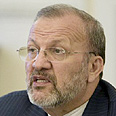
Iran vows to pursue nuclear work despite incentives
Tehran vows to continue uranium enrichment program after handing EU its response to latest incentives proposal. In first public address of matter Iranian government says willing to 'hold talks in the framework of preserving Iran's nuclear rights'
Iran vowed on Saturday to pursue its uranium enrichment program, a day after delivering its response to an incentives package by world powers trying to curb its nuclear ambitions.
No details were released of Iran's formal reply on Friday - submitted to EU foreign policy chief Javier Solana - to the offer of talks on benefits if Tehran halts enrichment the West suspects is for nuclear bombs. Iran says its plans are peaceful.
In its first public statement after giving the response, government spokesman Gholamhossein Elham said that Iran had no intention of discussing its "right to enriching uranium".
"Iran's stance has not changed (on uranium enrichment) and we are ready to hold talks in the framework of preserving Iran's nuclear rights," Elham told a news conference on Saturday.
Foreign Minister Monouchehr Mottaki said Solana would meet Iran's chief nuclear negotiator Saeed Jalili in the next two weeks for preliminary talks.
"They will start to establish a modality for continuation of this cooperation," Mottaki told Malaysian private broadcaster Astro Awani in an interview broadcast late on Saturday.
Solana's spokeswoman said he was willing to meet Jalili soon, but gave no details. "In principle, the position is to respond favorably," she said.
'No breakthrough on incentives'
Last month Solana gave Iran a letter from the foreign ministers of the US, Britain, Russia, China, France and Germany and a package offering Tehran technology and negotiations if it suspends uranium enrichment, which the West fears could be used to make atomic weapons.
According to the European diplomatic officials quoted in the New York Times, the Iranian response said, "The time for negotiating from the condescending position of inequality has come to an end," and also criticized the United Nations Security Council sanctions against it as “illegal” and spoke of a “lack of trust” because of the “duplicitous behavior of certain big powers”.
The Times said some officials involved in the talks expressed disappointment. “There is nothing new in the response,” one of them was quoted by the newspaper as saying. Another official told the New York Times that there might have to be a positive spin by the six nations, simply because the Iranians had responded at all, without rejecting the incentives outright.
Deputy White House press secretary Gordon D. Johndroe said in a statement “we intend to study the Iranian response”. He said the United States would discuss the letter with the five other governments - Britain, France, Germany, Russia and China - “before responding formally.”
Though the nature of Iran's response to the incentive package has not been made public, a European official, speaking on condition of anonymity for discussing confidential information, did not describe it as a breakthrough.
''It was not something that made us jump up and down for joy,'' said the official. ''We are in a holding mode until we get a chance to look at it more closely.
AFP and Reuters contributed to the report










